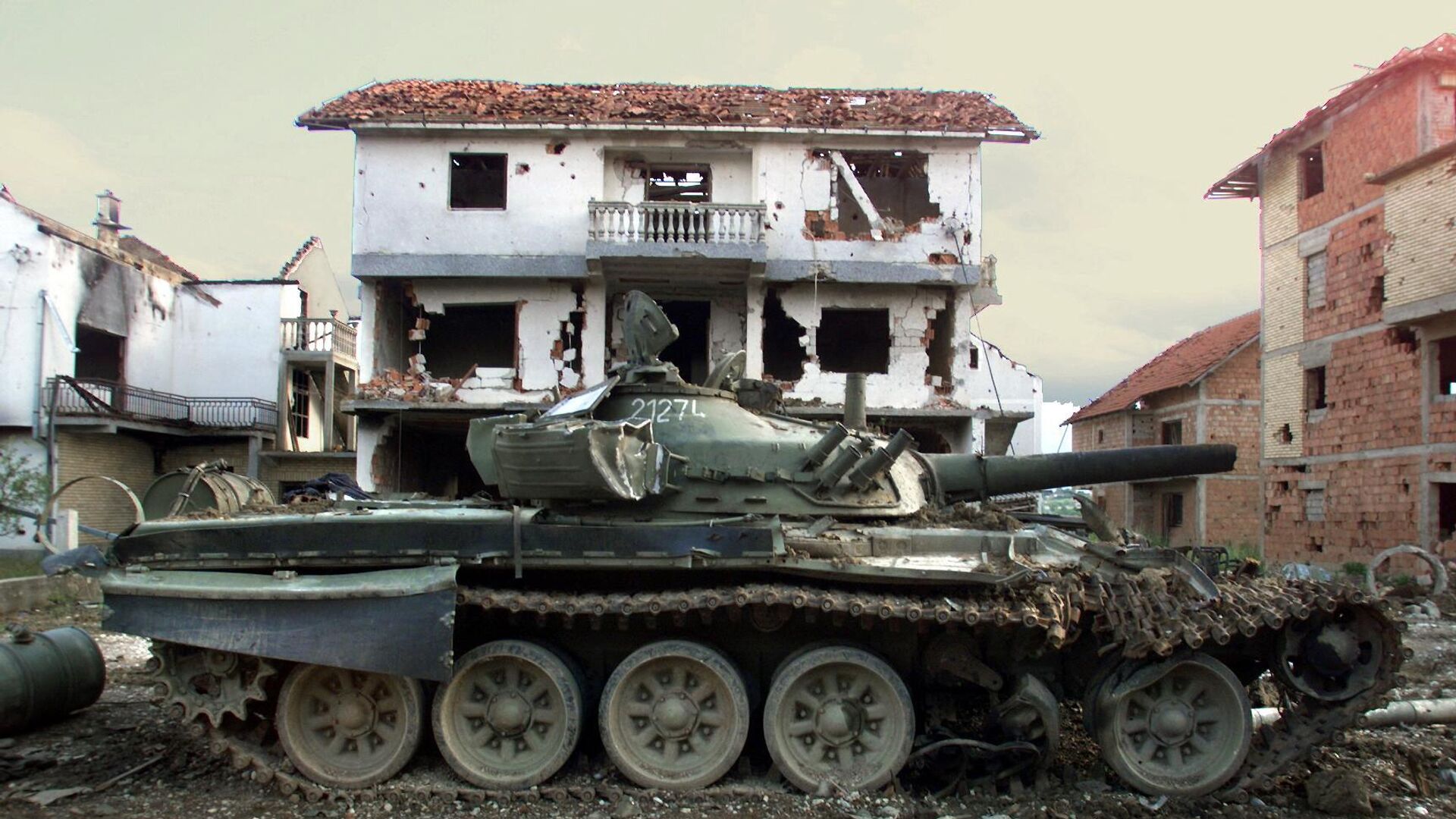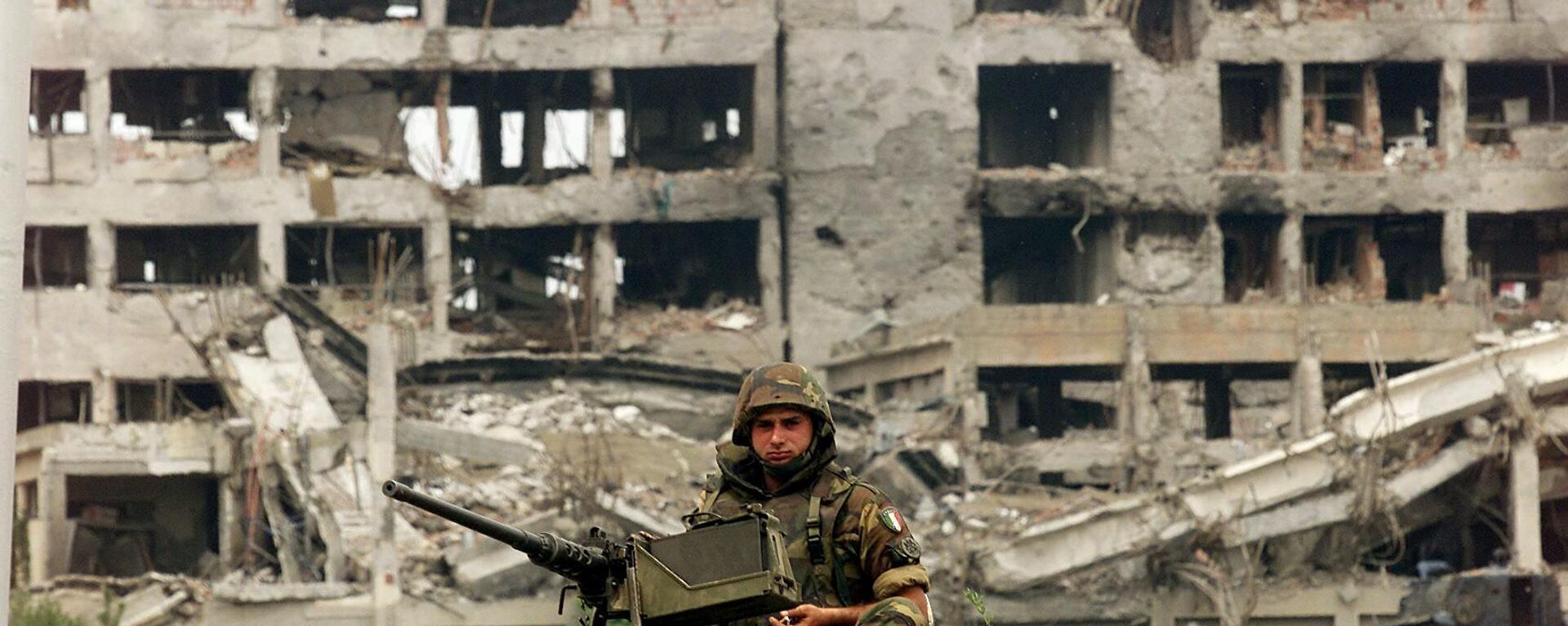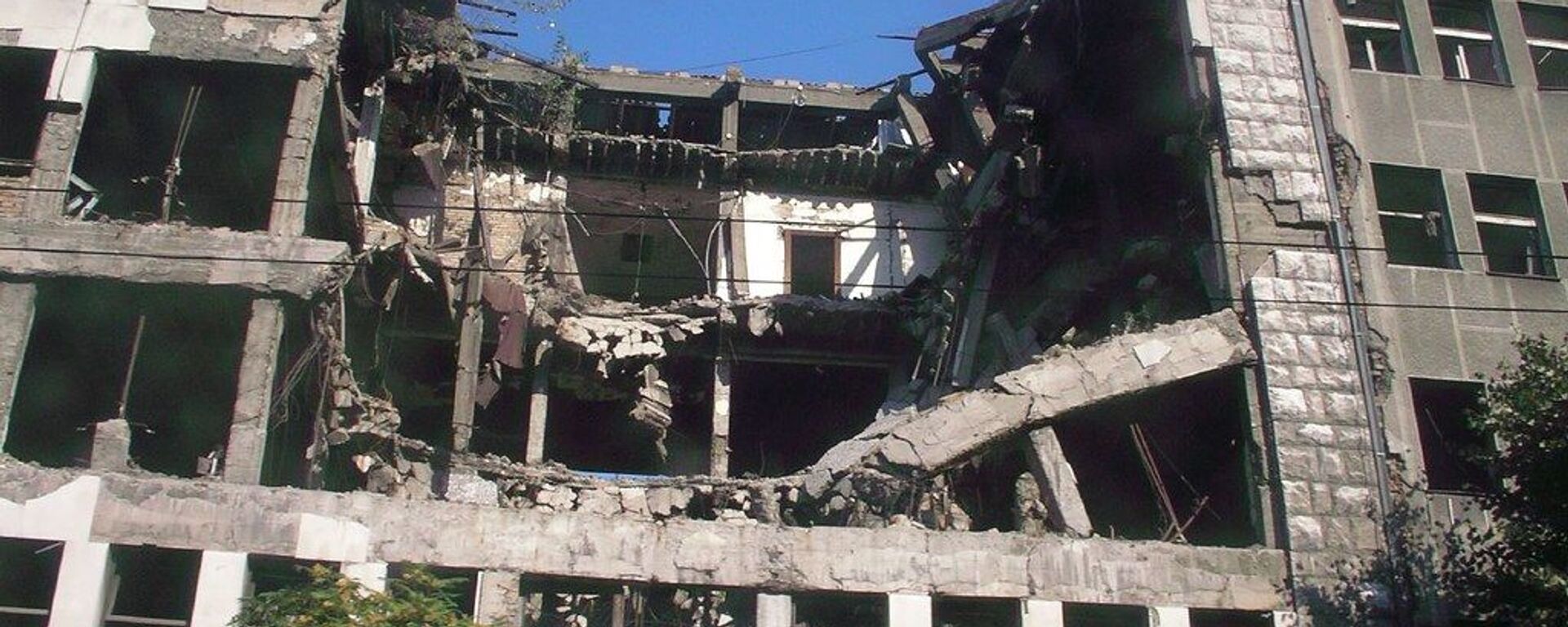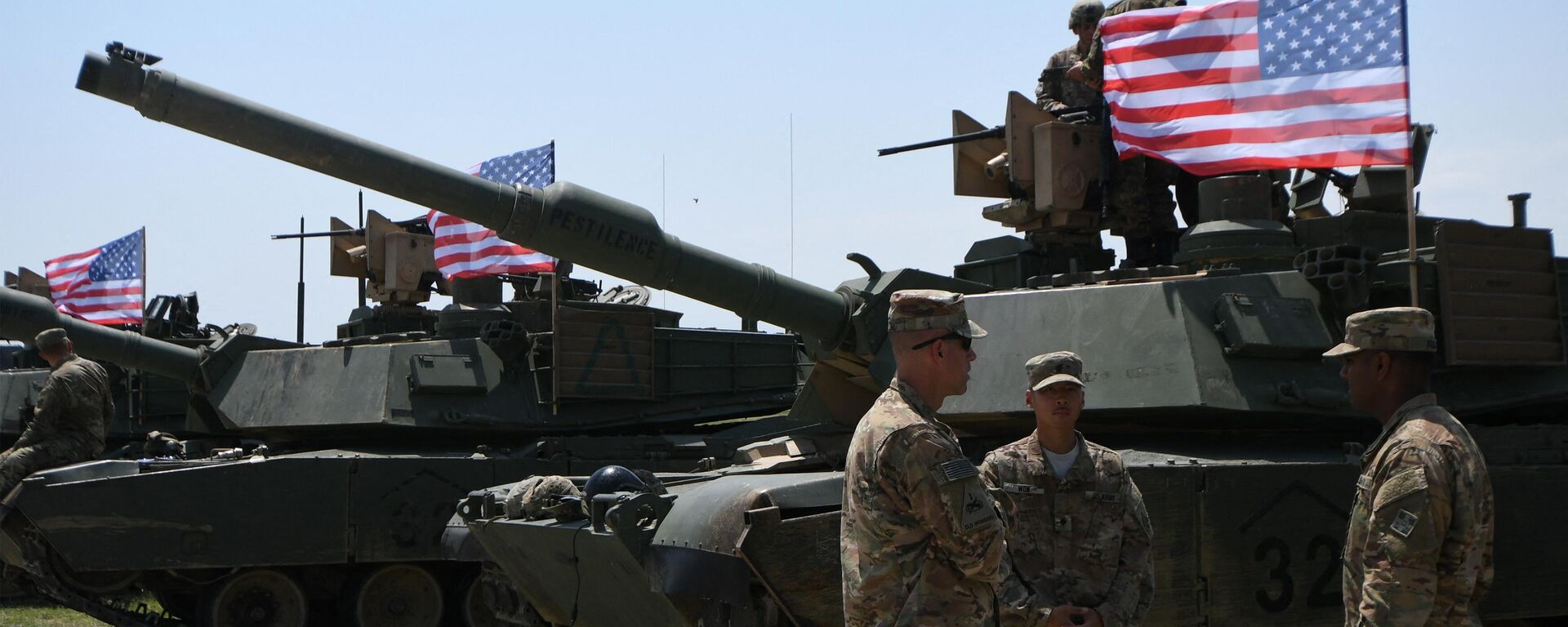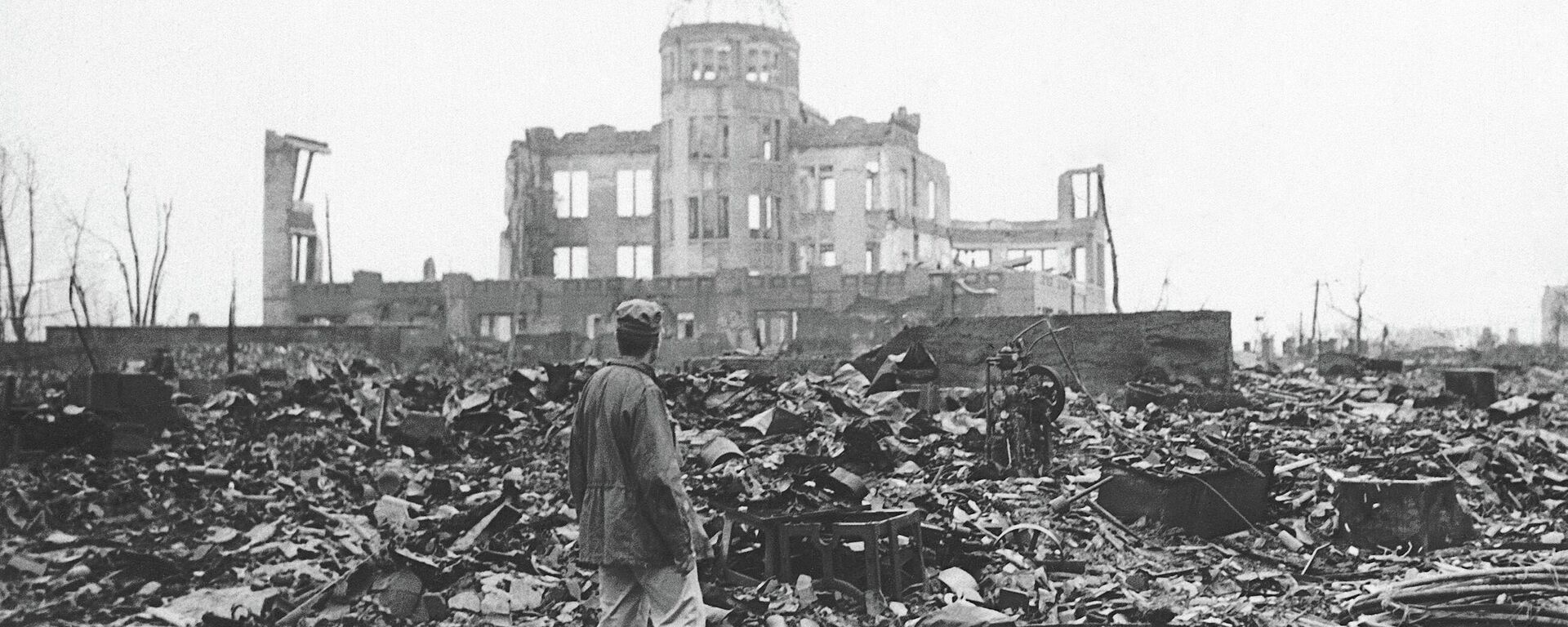https://en.sputniknews.africa/20240325/1065757590.html
25th Anniversary of NATO's Bombing of Yugoslavia: 'Culmination of Negligence of International Law'
25th Anniversary of NATO's Bombing of Yugoslavia: 'Culmination of Negligence of International Law'
Sputnik Africa
As long as liberal elites are at the helm of key Western countries, NATO will not be brought to justice over its bombing-related crimes in Yugoslavia, experts... 25.03.2024, Sputnik Africa
2024-03-25T00:01+0100
2024-03-25T00:01+0100
2024-03-25T10:07+0100
kosovo
serbia
united states (us)
north atlantic treaty organization (nato)
united nations (un)
yugoslavia
dirty bomb
bombings
attack
west
https://cdn1.img.sputniknews.africa/img/07e8/03/19/1065757768_0:0:1728:972_1920x0_80_0_0_ccc8302b394ff42beb5812a6a65f2f7d.jpg
Sunday commemorates the 25th anniversary of the start of NATO’s 78-day bombing campaign against Yugoslavia, which was launched without UN approval and claimed the lives of at least 2,500 people.In an interview with Sputnik, Dr. Stevan Gajic, a Balkans expert and research associate at the Belgrade-based Institute of European Studies, said that the beginning of NATO’s "illegal attack" against Yugoslavia on March 24, 1999, became "a precedent that opened Pandora's box."He pointed to "many different ways" in which the Western countries and the United States, in particular, used to "word their new approach." Gajic recalled that in the 1990s, "the popular phrase was a ‘responsibility to protect’ or RTP, which is, in essence, mean amount [of clout]" related to the West rather than the UN and its Security Council.Touching upon the fact of NATO forces using depleted uranium munitions against Yugoslavia, Gajic noted that the alliance is trying to hush up the topic because "it is very unpleasant", given numerous lethal cases related to NATO soldiers who – apart from locals – also suffered from this kind of weapon. Serbian President Alexandar Vucic, in turn, attributed the depleted uranium to a dramatic increase in cancer rates in his country, particularly among children whose parents were born in 1990 or after.He was echoed by Dr. Srdjan Sljukic, a professor of sociology at Serbia's University of Novi Sad, who told Sputnik that “NATO aggression against Yugoslavia was a very clear example” of double standards of "the key Western countries ruled by liberal elites.""Fortunately, the forces of a multipolar world, led by Russia and China, are getting stronger day by day, which means that we can hope to establish a really just world order in the future, a world order in which the words 'freedom and democracy' will not be just an empty phrase used to justify the use of force by liberal elites of the West," Sljukic said.Speaking to Sputnik, former Serbian Prime Minister and Deputy Prime Minister of the Federal Republic of Yugoslavia Nikola Sainovic, for his part, said that the NATO bombing of Yugoslavia marked a new era in international relations, which he described as "an era of broken agreements."Sainovic singled out such broken documents as the UN Security Council Resolution 1244, agreements on the Balkans, including the Dayton deal on Bosnia and Herzegovina or the Brussels accord on Kosovo, and the similar fate that awaited the Minsk Agreements that the West used to arm Ukraine.The ex-Serbian PM stressed that Yugoslavia sought to prevent the mass expulsion and extermination of its nationals, recalling the Russian special military operation's aims to fulfill similar tasks. Sainovic voiced hope that the era of "heresy" in world diplomacy will end and that the new global balance of power will bring respect for agreements back to international politics.Milan Mirkovic is one of those who survived the NATO bombing. His son Slavko was wounded in the head during the attack on a bridge in Murino, a village in the municipality of Plav, Montenegro, on April 30, 1999.He told Sputnik about the tragedy of Murino in which six civilians, including three children, were killed and 40 more were seriously injured.He added that he saw a NATO strike kill a man in a Murino street, depriving him of all his limbs, and witnessed scattered parts of legs and other body fragments, which he said was a "horrendous sight."Mirkovic said he was happy that his son managed to survive the strike, but that even 25 years on, the victims' families in Murino have not received any compensation.What Prompted NATO to Bomb Yugoslavia?NATO’s official justification for the strikes was its desire to "protect Kosovo Albanians from ethnic cleansing" and what the alliance described as a "humanitarian catastrophe."This was how the West responded to the operations conducted by Serbia's police and army against the Kosovo Liberation Army (KLA), which was considered a terrorist group in Serbia. By the summer of 1998, the KLA occupied almost 40% of Kosovo province and was waging a violent fight against the alleged "Serbian occupiers."Earlier that year, Yugoslav security forces neutralized one of the KLA leaders together with some of the group's members and civilians who refused to surrender. The West accused Belgrade of excessive use of force.In the fall of 1998, the UN Security Council called for an immediate ceasefire in Kosovo and the start of negotiations between the conflicting parties. Even though an Organization for Security and Cooperation in Europe (OSCE) mission was sent to Kosovo, the number of attacks on Serbs in the region continued to rise.February 1999 saw negotiations between representatives of Yugoslavia and the Kosovo Albanians in Rambouillet, on the outskirts of Paris, which were mediated by the US, Russia and the EU. The talks flopped because of a clause in the agreement that Belgrade considered unacceptable, namely, the deployment of a NATO-led force in Kosovo.In March 1999, the so-called Kosovo Verification Mission left the region, which was followed by then-NATO Secretary-General Javier Solana ordering the start of a military campaign. On March 24 of that year, NATO began to bomb Yugoslavia, bypassing the UN Security Council and unleashing one of the most illegitimate and bloody campaigns in the modern history of Eastern Europe.
https://en.sputniknews.africa/20240324/nato-humanitarian-intervention-in-yugoslavia-25-years-since-start-of-ordeal-that-killed-thousands-1065745028.html
https://en.sputniknews.africa/20240324/putin-calls-1999-nato-bombing-of-serbia-great-tragedy-war-launched-by-west-1065740073.html
https://en.sputniknews.africa/20240313/1065525876.html
https://en.sputniknews.africa/20240112/who-has-washington-bombed-since-1945-1064587215.html
kosovo
serbia
united states (us)
west
Sputnik Africa
feedback@sputniknews.com
+74956456601
MIA „Rossiya Segodnya“
2024
News
en_EN
Sputnik Africa
feedback@sputniknews.com
+74956456601
MIA „Rossiya Segodnya“
Sputnik Africa
feedback@sputniknews.com
+74956456601
MIA „Rossiya Segodnya“
kosovo, serbia, united states (us), north atlantic treaty organization (nato), united nations (un), yugoslavia, dirty bomb, bombings, attack, west, war
kosovo, serbia, united states (us), north atlantic treaty organization (nato), united nations (un), yugoslavia, dirty bomb, bombings, attack, west, war
25th Anniversary of NATO's Bombing of Yugoslavia: 'Culmination of Negligence of International Law'
00:01 25.03.2024 (Updated: 10:07 25.03.2024) As long as liberal elites are at the helm of key Western countries, NATO will not be brought to justice over its bombing-related crimes in Yugoslavia, experts told Sputnik.
Sunday commemorates the 25th anniversary of the start of
NATO’s 78-day bombing campaign against Yugoslavia, which was launched without UN approval and claimed the lives of at least 2,500 people.
In an interview with Sputnik, Dr. Stevan Gajic, a Balkans expert and research associate at the Belgrade-based Institute of European Studies, said that the beginning of NATO’s "illegal attack" against Yugoslavia on March 24, 1999, became "a precedent that opened Pandora's box."
"It was a culmination of negligence of the international law that started since the end of the Cold War. Absolutely, [the] 1999 [NATO campaign] was a precedent. We can even say that international law was in a way abolished at that moment. And, of course, after that chaos was introduced into the system of international relations," Gajic pointed out.
He pointed to "many different ways" in which the Western countries and the United States, in particular, used to "word their new approach." Gajic recalled that in the 1990s, "the popular phrase was a ‘responsibility to protect’ or RTP, which is, in essence, mean amount [of clout]" related to the West rather than the UN and its Security Council.
"So the West is the arbitrary of whether civil rights were endangered somewhere and whether this or that country should or should not be attacked," according to the expert. He added that Western elites view a war "as a police action and a perspective in which the West and the United States in particular, should be the only policeman that would go around and bully countries on the basis of their subjective assessment that they are harming human rights in this or that way, or that they are violating international law."
Touching upon the fact of NATO forces using
depleted uranium munitions against Yugoslavia, Gajic noted that the alliance is trying to hush up the topic because "it is very unpleasant", given numerous lethal cases related to NATO soldiers who – apart from locals – also suffered from this kind of weapon. Serbian President Alexandar Vucic, in turn, attributed the depleted uranium to a dramatic increase in cancer rates in his country, particularly among children whose parents were born in 1990 or after.
Gajic, for his part, didn’t rule out launching a "real investigation against NATO crimes" in Yugoslavia, which he said "can only happen after the serious geopolitical changes following the collapse of NATO in one way or the other."
He was echoed by Dr. Srdjan Sljukic, a professor of sociology at Serbia's University of Novi Sad, who told Sputnik that “NATO aggression against Yugoslavia was a very clear example” of double standards of "the key Western countries ruled by liberal elites."
According to Sljukic, the alliance’s bombing of Yugoslavia reflected at least "two sorts of crimes," such as "breaking the international law" and "bombing civilian objects and killing many civilians." The professor also warned that "as long as the Western countries are ruled by the current liberal elites, NATO countries will not be put on fair trial because of their crimes in Yugoslavia and all over the world."
"Fortunately, the forces of a multipolar world, led by Russia and China, are getting stronger day by day, which means that we can hope to establish a really just world order in the future, a world order in which the words 'freedom and democracy' will not be just an empty phrase used to justify the use of force by liberal elites of the West," Sljukic said.
Speaking to Sputnik, former Serbian Prime Minister and Deputy Prime Minister of the Federal Republic of Yugoslavia Nikola Sainovic, for his part, said that the NATO bombing of Yugoslavia marked a new era in international relations, which he described as "an era of broken agreements."
Sainovic singled out such broken documents as the UN Security Council Resolution 1244, agreements on the Balkans, including the Dayton deal on Bosnia and Herzegovina or the Brussels accord on Kosovo, and the similar fate that awaited the Minsk Agreements that the West used to arm Ukraine.
The ex-Serbian PM stressed that Yugoslavia sought to prevent the mass expulsion and extermination of its nationals, recalling
the Russian special military operation's aims to fulfill similar tasks. Sainovic voiced hope that the era of "heresy" in world diplomacy will end and that the new global balance of power will bring respect for agreements back to international politics.
Milan Mirkovic is one of those who survived the NATO bombing. His son Slavko was wounded in the head during the attack on a bridge in Murino, a village in the municipality of Plav, Montenegro, on April 30, 1999.
He told Sputnik about the tragedy of Murino in which six civilians, including three children, were killed and 40 more were seriously injured.
"People in Montenegro have never tolerated the fact that their country, which was bombed by NATO, joined the alliance in 2017. Six innocent civilians, among them three kids, were killed in our village. Actually, they killed our whole place. It hasn't recovered from the bombing and it never will. But we remember. We demand justice for the victims and for Murino," Mirkovic said.
He added that he saw a NATO strike kill a man in a Murino street, depriving him of all his limbs, and witnessed scattered parts of legs and other body fragments, which he said was a "horrendous sight."
Mirkovic said he was happy that his son managed to survive the strike, but that even 25 years on, the victims' families in Murino have not received any compensation.
What Prompted NATO to Bomb Yugoslavia?
NATO’s official justification for the strikes was its desire to "protect Kosovo Albanians from ethnic cleansing" and what the alliance described as a "humanitarian catastrophe."
This was how the West responded to the operations conducted by Serbia's police and army against the Kosovo Liberation Army (KLA), which was considered a terrorist group in Serbia. By the summer of 1998, the KLA occupied almost 40% of Kosovo province and was waging a violent fight against the alleged "Serbian occupiers."
Earlier that year, Yugoslav security forces neutralized one of the KLA leaders together with some of the group's members and civilians who refused to surrender. The West accused Belgrade of excessive use of force.
In the fall of 1998, the UN Security Council called for an immediate ceasefire in Kosovo and the start of negotiations between the conflicting parties. Even though an Organization for Security and Cooperation in Europe (OSCE) mission was sent to Kosovo, the number of attacks on Serbs in the region continued to rise.
During an operation in the Kosovo village of Racak in January 1999, Yugoslav security forces killed several dozen Albanian terrorists, with the OSCE mission dubbing the incident a "massacre of civilians". Later on, Finnish forensic scientist Helena Ranta, who performed the autopsy [of the bodies of Kosovar Albanians], admitted that the report on the killing of civilians was made under pressure from the head of the OSCE mission. The events in Racak subsequently served as a justification for the NATO attack on Yugoslavia.
February 1999 saw negotiations between representatives of Yugoslavia and the Kosovo Albanians in Rambouillet, on the outskirts of Paris, which were mediated by the US, Russia and the EU. The talks flopped because of a clause in the agreement that Belgrade considered unacceptable, namely, the deployment of a NATO-led force in Kosovo.
In March 1999, the so-called Kosovo Verification Mission left the region, which was followed by then-NATO Secretary-General Javier Solana ordering the start of a military campaign. On March 24 of that year, NATO began to bomb Yugoslavia, bypassing the UN Security Council and unleashing one of the most illegitimate and bloody campaigns in the modern history of Eastern Europe.
